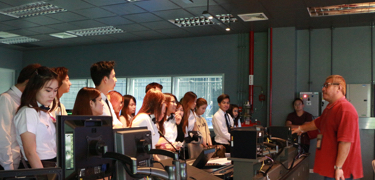Thailand’s decision to establish diplomatic ties with China 50 years ago was a bold political step, as the ideological conflict in the region was intense and Thailand was on the front lines of the Cold War struggle, former Prime Minister Abhisit Vejjajiva said on Wednesday.
At that time, Thailand was facing threats from the Communist Party of Thailand, while being firmly aligned with Western powers diplomatically.
“For the Thai side in particular, it was a bold move as Kukrit, who led a minority coalition government, chose to shift its foreign policy approach. This was a meaningful and strategic decision,” he said.
“Looking back 50 years, the decision by both governments to establish diplomatic relations was a momentous and courageous one. It offers valuable lessons for both sides.”
He was speaking at a forum on “50 Years of Thai-China Relations: Reflecting on the Past and Looking to the Future,” organised by Thai PBS and the Thai-Chinese Strategic Research Centre.
The forum was held to commemorate the 50th anniversary of formal Sino-Thai relations. Then Prime Minister Kukrit Pramoj made the first official visit to China in July 1975 and established official diplomatic relations.
Abhisit told the audience that he did not pay much attention to the number of years of diplomatic relations, “because I believe that the bond between Thai and Chinese people extends far beyond the numbers of years of relations,” he said, adding that this is why we often hear the familiar phrase, “China and Thailand are not strangers but brothers.”
He urged that we must not just commemorate, but learn lessons and look forward in shaping future bilateral ties.
For China, the year 1975 came just over two decades after a major national transformation. At that time, China was still undergoing political, economic and social changes and its foreign policy was still evolving.
Therefore, the establishment of diplomatic ties with Thailand signified a pivotal change, a display that the countries, with differing ideologies, could have fruitful and cooperative relations.
Shortly after diplomatic ties were established, Thailand saw a decrease in the threat posed by the Communist Party of Thailand, along with growing economic opportunities and trade.
In the past 50 years, relations between both nations have grown at all levels, from the royal family to government and people-to-people.
A symbol of this close bond is Her Royal Highness Princess Maha Chakri Sirindhorn’s visits to all of China’s provinces. No non-Thai royal has done that, Abhisit said, adding the Chinese public even voted her one of China’s closest international friends.
In the economic relations, over the decades, China and Thailand progressed from establishing a Joint Economic Commission, to declaring a strategic partnership in 2001, and then a comprehensive strategic partnership in 2012.
Most recently, both countries have affirmed their commitment to building a “community with a shared future.”
This growing partnership reflects the economic transformations in both countries. China has become the world’s second-largest economy, while Thailand has moved from a low-income to an upper-middle-income nation.
Annual trade between the two countries has skyrocketed, from just $4 billion 25 years ago to over $100 billion today. China has been Thailand’s largest trading partner for about 14 years, while Thailand ranks among China’s top trade 15 partners.
Tourism is another success story. Before COVID-19, about one-third of foreign tourists visiting Thailand were Chinese, contributing greatly to Thailand’s economy and cultural exchange.
True friendship is tested during times of crises, including the 1997 Asian financial crisis, when the situation in Thailand could have worsened significantly, had China devalued its currency.
Instead, China chose not to, providing critical support to the region.
During the 2008 global financial crisis, Abhisit said, when he served as prime minister, Thailand and China, along with ASEAN, pushed forward with the ASEAN-China Free Trade Area agreement, despite global economic instability.
In the early days of the COVID-19 pandemic, Thailand supported China with mask donations and other aid. The first vaccine used in Thailand was from China, another sign of our close cooperation.
“For the future, however, we must be honest with ourselves. No international relationship is without challenges and good friends must be willing to face those challenges with openness and honesty,” Abhisit said.
Every country has a small number of people who may cause trouble. In today's political climate, such issues can quickly spark anti-foreign sentiment and strain international relations.
Then comes the media’s crucial role, as responsible reporting can help prevent small incidents from damaging relationships.
Responsibility also lies with governments, though, in enforcing laws fairly and effectively. If problems arise, they must be addressed swiftly to avoid misunderstandings and resentment.
Tourism, too, is facing problems, with Chinese tourist numbers having dropped sharply, partly due to safety concerns. To resolve this, both countries need frank discussions, to identify and address the root causes, building mutual confidence again.
“I firmly believe that young people, students, researchers and entrepreneurs, will lead the next chapter of Sino-Thai relations, which include cultural and academic exchanges, health cooperation and joint research,” Abhisit said.
Those are the key lessons from the past 50 years, despite there being ideological differences.
“Mutual respect and friendship have led us toward shared prosperity. The close bonds between the Thai and Chinese peoples, many of whom share a heritage, remain our strongest assets,” noted Abhisit.
At present, the leaders in the west seem to be backing away from their former roles in safeguarding the world’s order.
It is now an opportunity for China, ASEAN and Thailand to connect with other countries to shape a new and fairer world with sincerity, mutual respect and multilateralism, he concluded.

